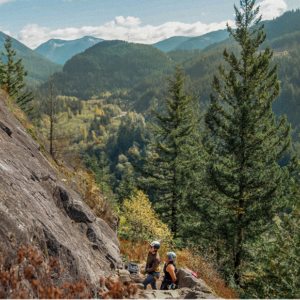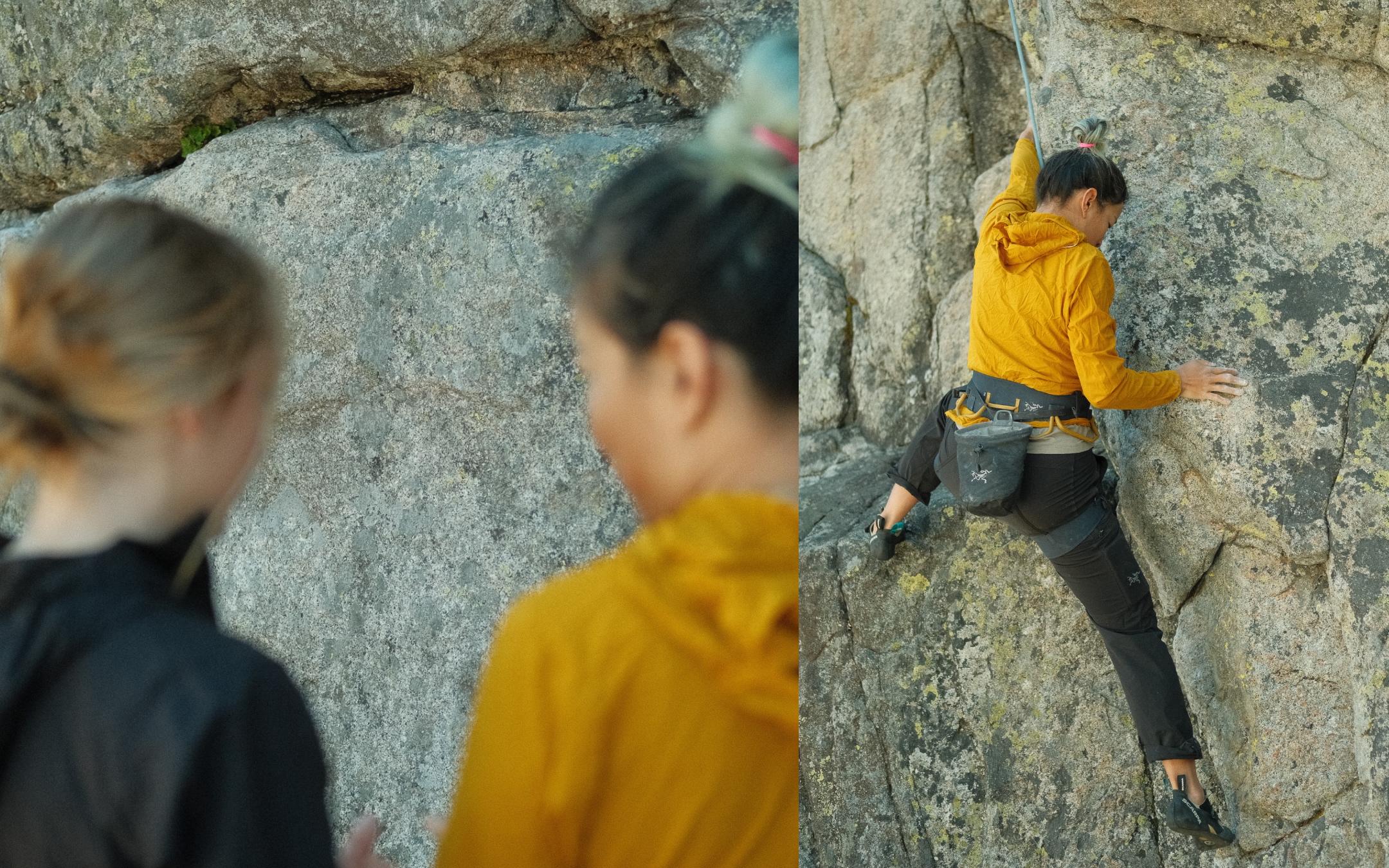Arc’teryx embraces the adventure of moving Beyond the Binary with a new series of training modules, thanks to a council of queer employees, a gender specialist and the proven benefits of embracing one’s range.
Words by: Lisa Richardson | Photos by: Victoria Wells & Bryan Anton
“The outdoors can create a connection to your body and to the land and to other people,” says Arc’teryx Global Ambassador, Shelma Jun (they/she), a former urban planner, AMGA apprentice rock guide, and Managing Director and founder of Flash Foxy. “It’s a vehicle to be very present in oneself.”
But no-one progresses without support, which is why a community that accepts you completely is a big piece of the outdoor life. That’s what propelled Jun initially to found Flash Foxy back in 2014, and the Women’s Climbing Festival in 2016 – to create spaces of connection for women climbers.
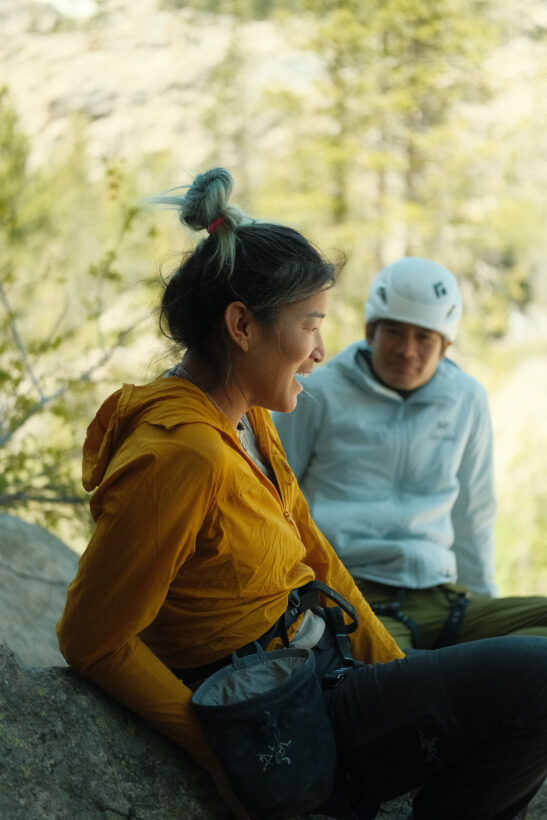
 At that point, even talking about women’s issues, or about women having different experiences, was a polarizing thing.
At that point, even talking about women’s issues, or about women having different experiences, was a polarizing thing.
Since then, Jun, Flash Foxy, the climbing community, and the conversation about gender have expanded and evolved. Flash Foxy expanded its mission in 2021 to explicitly include all trans and gender nonconforming folks in their community. “It shows how much growth there’s been in this space,” says Jun. Inclusion is like that. It keeps expanding the circle of who and what aspects of ourselves can show up.
“As a queer immigrant person of colour, I realized I was leaving parts of myself at home that didn’t fit in. As I’ve grown and consciously tried to be myself more fully, I want everyone to be able to feel that, to be really present in your body to its full capacity.”
Jun’s candour, and willingness at the helm of Flash Foxy to delve into what makes spaces safe and welcoming when things move beyond the binary of men and women, has made her a leader in the outdoor industry, and a beloved and appreciated educator in this space, even though she is quick to point out that she does not speak for everyone: “Our community is not a monolith.”
“People have started to treat non-binary as a third gender – we have men, women and non-binary folks. But non-binary is so much more than that. It holds opportunity and possibility beyond static genders. To think beyond the binary is to know that there’s a spectrum and one’s position in that space is fluid.”
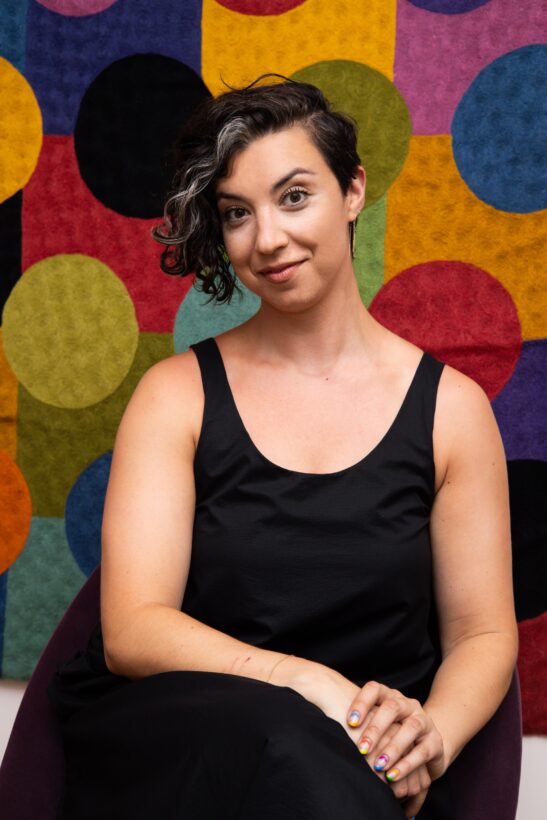
Gender fluidity and thinking beyond the binary is new terrain for many. Explains clinical social worker, consultant, and gender specialist Rebecca Minor (she/they), “One of the very first foundational truths most people pick up, very early in life, is how to organize people in the context of gender. These kinds of structures are very comforting. When we tell people: ‘Guess what? There are actually more than two genders, it’s really destabilizing. As humans, we love certainty. So much of what trying to move beyond binary thinking is, is an invitation to be uncertain. That is not an invitation that everyone is interested in receiving.”
Climbers and climbing-adjacent folk, arguably, are well-poised to think beyond the binary – as scary as things get, a climber is practiced at moving through tenuous terrain. They know the expansive feeling that awaits after moving through unsure ground and personal cruxes. They also know the lift that comes from having safe genuine support, cheering, watching, and belaying, through the tough parts.
With over a decade of experience both in clinical work and consulting with businesses and organizations, Minor has seen firsthand how diverse perspectives expand mindsets and enhance innovation. “Having someone with the capacity to queer is an invaluable asset to any team. It brings unique perspectives and problem-solving abilities that drive collaboration and forward momentum for an organization.”
Venturing into new terrain is easier, though, when there’s a map. Education helps to provide tips on how to navigate and how to conduct oneself and how to reorient after making a mistake or getting lost. That’s the point behind the self-paced learning modules on gender and sexuality that Arc’teryx has designed, with help from Minor and the team members on Queer SV, an internal Queer Employee Belonging Council. The invitation is for everyone to be curious about how and where they might upgrade their tools or skills to contribute to something better.
“The more people on the climb to expanded gender and sexuality awareness, the better,” says Jessica O’Dowd (she/her), Arc’teryx Senior Manager of Equity, Diversity, and Inclusion. “We want to give our 3000-strong collective the competence and the confidence to navigate experiences and interactions without the limitations of binary thinking. We know this will have a ripple effect on the work they do and the communities they touch. We intentionally brought Rebecca in because her approach to this work is welcoming, playful, intentional, and accessible. It eases people in and calls them to push their edges.”
Playing at our edges is where growth happens. In the natural world, edges are also where the greatest diversity is.
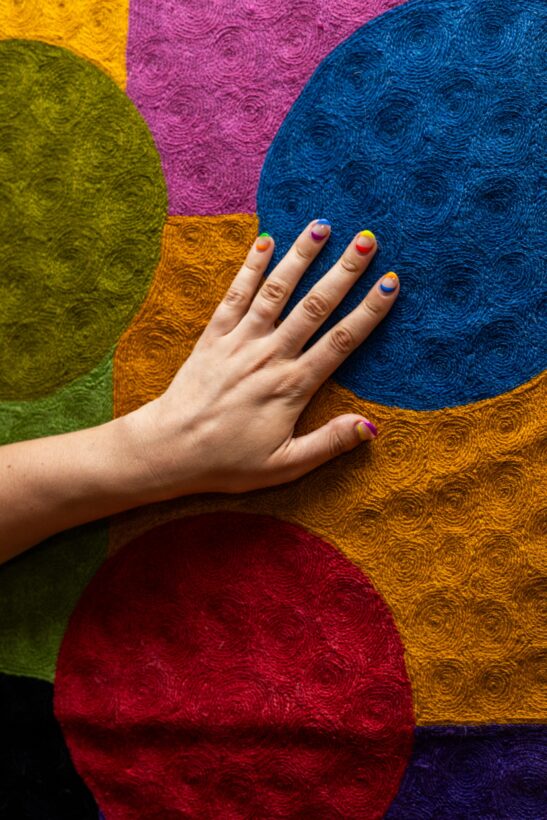
 Queerness, by definition, is strange and weird. It will always be questioning and challenging what is ‘normal’.
Queerness, by definition, is strange and weird. It will always be questioning and challenging what is ‘normal’.
In a way, queer-friendly operating modes create a permission slip for everyone to embrace and explore their own weirdness. Climbers have historically been an unconventional crew, pushing against social norms of how we should live. Moving beyond the binary is itself an opportunity to expand into new and exciting terrain. Like any mindset shift, it takes time and effort. And courage.
It’s worth it.



